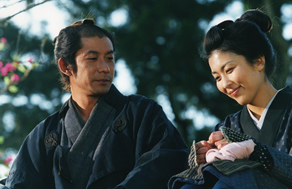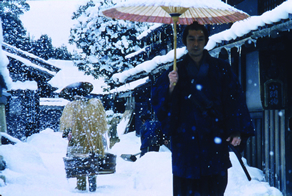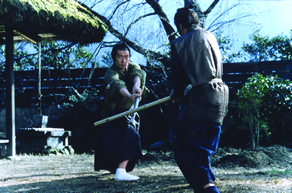Festival:
In competition – 55th Berlin International Film
Festival
Asia Pacific Film Festival ('04, Closing Film)
Tokyo ('04, Opening Film)
Genre: Drama
Director: Yoji Yamada
Starring: Masatoshi Nagase, Takako Matsu, Hidetaka
Yoshioka, Yukiyoshi Ozawa, Tomoko Tabata, Reiko Takashima
RunTime: 2 hrs 11 mins
Released By: Golden Village
Rating: NC-16
Release
Date: 21 April 2005
Synopsis
:
In
the mid-19th century, during the final days of the Shoguns
and the Samurais, the winds of change blowing throughout the
country are beginning to be felt even in the Unasaka domain,
a small fief on the northwest coast of Japan's main island.
Two friends, Munezo Katagiri (Masatoshi Nagase) and Samon
Shimada (Hidetaka Yoshioka), see Yaichiro Hazama (Yukiyoshi
Ozawa) off on his journey to take up an important position
within the clan organization in distant Edo. The two return
to Munezo's home, a modest dwelling befitting a samurai who
lives on a tiny stipend of only 30 `koku' of rice per year,
but a place of warmth and laughter he shares with his mother,
his younger sister Shino (Tomoko Tabata) and Kie (Takako Matsu),
a pretty farm girl working as a maid while she learns the
skills and manners she will require to make an advantageous
marriage.
Three years pass, in which time Munezo's mother has died,
concerned that her son remains without a wife, and his sister
has married Samon, leaving Munezo alone in their house with
one elderly maid. Kie has married into the Iseya, a family
of oil wholesalers, and Munezo assumes she is living happily.
Encountering her out shopping one winter's day, he notices
that she has grown thin and sad, and feels a tug at his heart
as he watches her walk away through the snow.
Several months later. Under the direction of an official from
Edo, Munezo is one of several samurai studying the new science
of artillery. Hearing that Kie is ill, he and Samon hurry
to the Iseya. Reluctantly admitted by Kie's mother-in-law,
he finds her lying half-dead in a dimly lit storeroom. Ordering
her husband to institute divorce proceedings, he carries her
back to his own home.
Gradually she recovers, her younger sister comes to help,
and Munezo's house once again becomes a place of gaiety and
laughter. However, a plot by members of the clan in Edo against
its leaders is brought to light, and fearful that this will
come to the attention of the Shogun's government, those responsible
are ordered to commit suicide. Yaichiro is also implicated,
and he is 'sent down' to the clan's domain, where he is imprisoned
in a small hut deep in the mountains.
Munezo and Yaichiro were two of the best students of Kansai
Toda (Min Tanaka), former fencing instructor to the clan.
Yaichiro was actually the better of the two, but for some
reason Toda chose to impart his secret 'Oni No Tsume (devil's
claw)' technique to Munezo.
The clan's chief retainer, Shogen Hori (Ken Ogata), summons
Munezo and informs him that he is suspect due to his association
with Yaichiro, and demands the names of others Hazama is friendly
with. Munezo, saying that it is a samurai's duty to respect
confidences, refuses to tell him.
The presence of Kie in Munezo's home makes him the subject
of criticism. He has resolved to send her back to her family
once she is recovered, but now tells her of a long-held dream
of his, to take her with him on a journey across the sea.
Thus made aware of his feelings for her, she feels her own
heart begin to pound.
Yaichiro escapes from confinement and takes refuge in a farm
house, taking an inhabitant hostage. Ogata (Nenji Kobayashi),
the clan's chief overseer, orders Munezo to kill him. The
end of the samurai's world is now in sight, but that world
is not yet ready to let Munezo go free.
Movie
Review:
To
fully appreciate the movie, some basic understanding of the
Samurai history may be necessary.
The
Samurai, or bushi, were Japanese military warrior well crafted
with the skills of bow and arrow, spears, and most notably,
sword. Initially employed to protect the properties belonging
to powerful landlords, the demand of Samurai later rocketed
during the age of the Japanese civil war (Sengoku jidai) where
these landlords fight over various provinces in Japan. War
among them raged for the next few decades until the middle
of the 16th century, where one of them,
Toyotomi Hideyoshi, successfully united the whole Japan.
In
order to gain absolute control over his people, Hideyoshi
consolidated all Samurai in castles and forbade anyone, except
the Samurai, to use the sword. The hierarchy of social castes
was thus formed, with the Samurai, who were both respected
and feared by the commoners, on top of the caste, followed
by the farmer, artisan and merchants. Within each caste was
further division of social status.
The
Samurai served as soldier for the respective province and
in return received income from their Lord in the form of rice,
which was then the official currency. This system of social
hierarchy (caste) continues into the Edo period (1603 - 1868),
even after Hideyoshi death.
"The
Hidden Blade" was set nearing the end of the Edo period
where the Japanese and other Asian countries had been forced
to signed unequal treaties that gave the Westerners economical
and legal advantages in Japan. Determined to regain independency
from the
Westerners, the then Meiji government quickly reform all areas
in Japan by learning the westerners ways, which includes learning
their military skills.
No
doubt the introduction of western cultural and military marks
the beginning of the gradual abolishment of the Samurai, nevertheless,
director Yoji Yamada had hilariously portrayed the unsuspicious
Samurai clumsily trying their best to learn to march and run
like the western foot soldier, as well as to operate the westerns'
firearms and artillery. Unlike other typical Samurai movies,
where these fearless warriors were all cold and serious, Yamada
had exposed the fears (to learn new things) and shown audience
a warmer and lighter side of the Samurais.
On
the romance department, the stiff and rather unromantic, Master-servant
relation between lower castes Sumurai, Munezo Katagiri (Masatoshi
Nagase) and his maid, Kie (Takako Matsu), had failed to charm
the audience. It is the tragic love between rebel Samurai,
Yaichiro Hazama (Yukiyoshi Ozawa) and his wife that is more
moving, unfortunately that minor side plot is plainly touch-on.
The movie title may sound action packed. However, if you are
expecting many sword-fighting sequences in the movie, you
will be disappointed. The movie merely feature two but absolutely
thrilling fighting scenes. First was when Katagiri seeking
advice from his ex-sinseh,
Toda, on ways to counter Hazama, who was consider the No 1
swordman of the Unasaka clan. Although both were shown practising
using wooden poles, the scenes were impressive enough to marvel
audience. Finally were the showdown between Katagiri and Hazama
in a beautiful mountainous countryside. The sequence were
however too quick and swift to satisfy the audience. You wish
the director would throw in a few more such sequences, however
you will never realized this dream. Instead, the filmmaker
choose to slowly tell the story of a struggled hero finding
his position in the midst of the western influence but ended
being nosed around by the scrupulous, political ploy of the
upper castes Samurai, something similar to Yamada's previous
works "The Twilight Samurai".
Finally
you may asked, What is "the hidden blade?" It is
a well-guarded ancient martial art happened to be imparted
to Katagiri. I intend to play Katagiri here by also keeping
mum about it or else it would spoil your viewing experience.
But be prepared for a shocking revelation!
The
movie is a non-commercialized gem, but ironically because
of this, it is also easily neglected and forgotten by most
audience.
Movie
Rating: B
Review
by Leosen Teo
|




